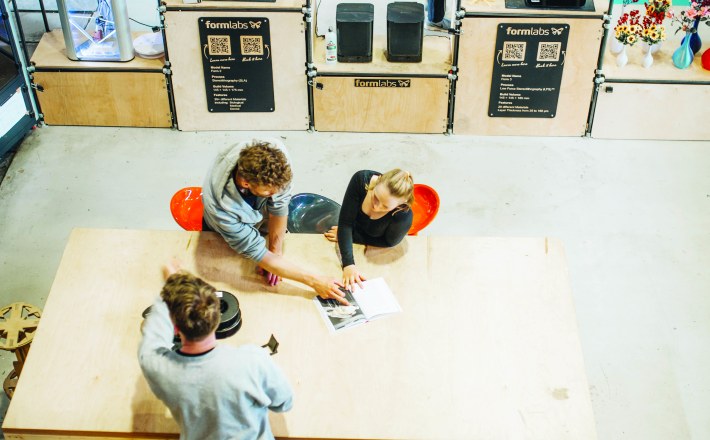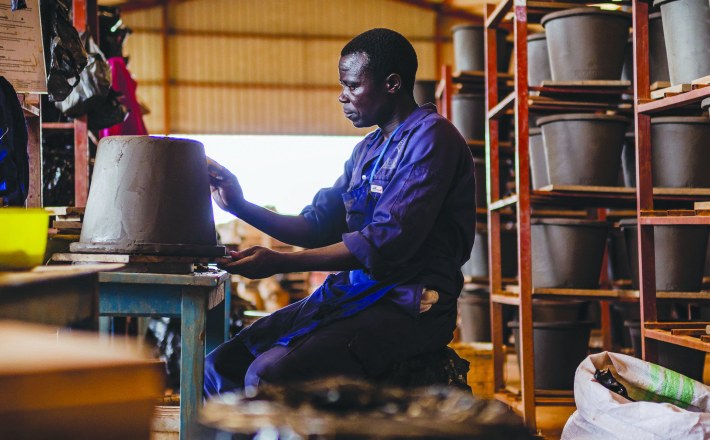Asking for Help
Kevin Braddock gathered all his strength to ask for help during a severe depressive episode — then the journalist launched Torchlight, a project aimed at encouraging others to do the same. About a glimmer of light in the darkest moments.
For a long time, wine was a man’s game. However, a team of young French women are now transforming the industry — with organic and natural wines, which are neither chaptalised nor acidified, and with no tannin powder or added sulphites. They are produced as they were centuries ago, under the motto: less is more. Two women champions of natural wine tell us their story.
The bleakest phase in Kevin’s life started on a sunny day in August. Sadness is harder to bear when everyone else seems happy. Kevin Braddock had just quit his job. He sat at the bottom of a tall building where, until recently, he had helped to create the latest trends as editor in chief of a lifestyle magazine. Kevin seemed to have arrived at the top — which made his fall even harder.The responsibility of sitting in the driving seat was too much for him, the writer. Adding to the stress were physical ailments, a chronic illness, and personal problems. Everything in Kevin’s life seemed to be going wrong. Ending it all, the pressure, the stress — more and more Kevin became plagued by these thoughts. It is perhaps the darkest form of irony that, in his saddest moment, he was simply too drunk to put his self-destructive plan into action. He eventually posted a message on Facebook: ‘Can someone who speaks German please come with me to the hospital?’ Then came the three words that would change his life. ‘I need help.’ The first responses appeared on screen in seconds, then came calls, and finally friends who went with Kevin to the hospital. The diagnosis: a depressive episode. Not the first one in his life, but certainly the worst. ‘I had reached a point where I was willing to put an end to it all — or I’d have to ask for help,’ says Kevin. ‘Help arrived, and I’m truly grateful. My life has been turned on its head since then.’ He is still healing, he says.

Instead of playing the role of editor in chief — the bon vivant — Kevin now seems thoughtful and reflective, willing to admit his weaknesses. And he’s open as well, especially with others like him, because he has learned to ask for help. Men find that especially hard. Even today, many young boys are raised to be strong and confident, and to avoid weakness or fault lines in life like the plague. The man, the provider, the stronger sex — studies have shown that this social pressure is reflected in suicide rates, which are almost three times higher among men. Kevin wants to dismantle the traditional masculine image by showing the courage to be vulnerable. To do this, he has created a beautifully designed magazine that clearly reveals his years of experience. He collaborated on the project with editor Emma Warren and designer Enver Hadzijaj — friends and colleagues who have accompanied Kevin on his journey. The result is Torchlight: A Publication About Asking For Help. It’s Kevin’s story, but also that of countless others who suffer from depression. Spread across 150 pages full of articles in the format of reports, journal entries, and streams of ideas, Kevin explains what it means to stumble and get back up again — to go from the beginning of the end to the end of a new beginning. ‘Berlin’ is one of the first articles. Divided into chapters, it describes the onset of depression in a sensitive, thoughtful, and profoundly literary style. By contrast, ‘Spring Comes’ deals with the return of hope, like the first rays of summer banishing the darkness of winter. One of the final features — ‘Things that Work’ — provides a 13-point guide of the things that helped him most.
Number one: asking for help, of course! Eating, meditation, and love also feature, as does nature, a theme that connects the texts through photos of flowers and landscapes. Nature, as a vital source of vitality, in general played an important role in his recovery. Kevin’s healing process began with the basics — by quite simply taking a break. During this time, he moved from Berlin back to London to begin a course of long-term psychological counselling. He went hiking, took extended bike tours through the Pyrenees, regularly practiced tai chi, and spent plenty of time with his friends and family. Hitting rock bottom made him realise how many people he had in his life, how many friends were willing to offer him time and support. In the end, though, it wasn’t just the support from friends or the counselling sessions that got him back on his feet. It was also the time he chose to spend with himself that made abig impact.Kevin has created a set of Torchlight Practice Cards, tips for daily self-care that came to him during those periods of time. Divided into Idea Cards and Action Cards, they are intended to inspire the spirit and to encourage an active lifestyle — playfully, of course. ‘Make a Game out of Getting Better’ is the slogan of the cards. They are mostly simple things, but they can seem insurmountable to people in the throes of depression: learning the sun salute exercise in yoga, for instance, or calling old friends and relatives for no particular reason.
One of my favourite cards is the instruction to make your bed every day,’ says Kevin. ‘At first it doesn’t sound like much. But daily routines and regular tasks can help you bring structure back to your life and provide a few little anchors.
Kevin Braddock
‘One of my favourite cards is the instruction to make your bed every day,’ says Kevin. ‘At first it doesn’t sound like much. But daily routines and regular tasks can help you bring structure back to your life and provide a few little anchors.’ There’s a joker in the set as well: ‘Just do nothing’. To get better, for Kevin, this is important as well. ‘Healing is hard work, so you need time off too,’ he says with a laugh. Do depressed people walk through life feeling perpetually sad? ‘That’s a dumb cliché,’ says Kevin. His frankness is refreshing. It wasn’t long after the publication of Torchlight magazine and the set of cards that Kevin started receiving invitations to give talks and workshops at schools, universities, workplaces, and festivals. Other people with similar conditions now use the project’s website to share their stories, their suffering, and how they have learned to live with the insidious condition. That’s all despite Kevin originally having planned Torchlight just for himself, as a kind of self-reflection in the magazine format he knew so well, to support his healing process. ‘Depression is an incredibly egocentric disease that drags you into an obsessive vicious cycle of self-destructive thoughts. And the ‘me-ness’ of it all makes you feel even more guilty and ashamed in the end,’ says Kevin. At first it seemed self-indulgent to write about it. But after a friend told him that depression had driven his sister to suicide, Kevin decided to share his story. And to show others that they are not alone. Initially Kevin only told friends about the project, and printed just a handful of copies of the magazine and cards. He gave most of them to friends and acquaintances, while the tiny amount remaining was distributed by newsagents in London and Berlin. The small print run flew off the shelves, so Kevin started a crowdfunding campaign to finance a second edition of the magazine. It took just three days to exceed the funding target.The success of Torchlight underlines the urgency of its topic in a way that only studies and surveys can otherwise achieve: around 350 million people suffer from depression worldwide, according to figures released by Germany’s Federal Ministry of Health. Meanwhile, the World Health Organization has warned that mental conditions will have become the second most common type of disease by 2020. Those affected find it hard to find joy in everyday life.With Torchlight, however, Kevin wants to show people that it can be done — and not just the people directly affected by depression. Everyone has darker days or periods.Torchlight is intended as an anchor in everyday life. All the same, he wants to emphasise that anyone experiencing the symptoms of a serious condition should consult a doctor or therapist.Fighting depression has since become almost a full-time job for Kevin. He regularly posts self-help tips on his YouTube channel and on Instagram, and he will put out two new products — the second volume of Practice Cards and an accompanying guide to them — through crowdfunding in February. Alongside that he is working on other ideas for Torchlight, like a paperback adaptation that goes to print in May. Kevin is doing better. But he still feels overwhelmed from time to time. Things get too much for him every now and then, and that’s when they resurface, the thoughts about ending it all. Now, though, all of these things are outweighed by the knowledge that there are people around him who matter, who help him, and that there are moments of light in life, however dark things may seem. A crumpled-up Post-it is stuck to the back of his magazine. ‘Pass it on,’ it says.
Healing is hard work, so you need time off too.
Kevin Braddock
Torchlight’s Tips for Getting Better
Actions
Dance for ten minutes to three songs
Wake up, get moving, and loosen up. The happiness hormone serotonin is at its lowest first thing in the morning, but physical action helps it start to circulate. Dance like nobody’s watching.
Plan it, buy it, cook it, and eat it together
Depression feeds off loneliness and isolation, so getting together and doing something collaborative is a good way to break the funk and get you involved with others.
Go for a walk with no destination
Most of the journeys we make are destined: they’re about getting somewhere specific. But going for a walk with no destination is a way to get lost in the moment, allowing yourself to enjoy whatever you find.
Ideas
One day at a time: try living that way
One of the most effective ideas for recovery. Anxiety is often focused on the future — worries about what will happen tomorrow, next week, or next year. But staying in the day you’re in helps take the sting out of it.
Marcus Aurelius: read a few of his ‘Meditations’
With its emphasis on acceptance and self- reflection, the Stoic philosophy of the Roman emperor is very well suited to dealing with depression and anxiety.
Find out more about the latest crowdfunding campaigns and get your copy of Torchlight and the Practice Cards at torchlightsystem.com




